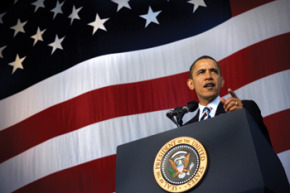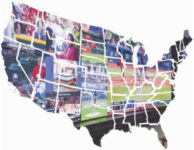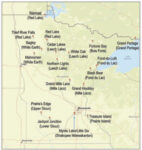
091026-N-5549O-249 JACKSONVILLE, Fla. (Oct. 26, 2009) President Barack Obama delivers remarks to an audience of Sailors and Marines before introducing President Barack Obama during a visit to U.S. Naval Air Station Jacksonville. During his visit he also met with gold star families-families that have lost a loved one in Iraq or Afghanistan, to personally thank them for their sacrifice. (U.S. Navy photo by Mass Communication Specialist 2nd Class Kevin S. O'Brien/Released)
As the November 6, 2012 presidential election approaches, the major candidates are now focused on the key issues of the day: creating jobs, improving the economy, regulating the price of gasoline, and managing conflicts in the Middle East.
Like most citizens across the country, Native Americans are closely following the candidates’ various views on these issues. Tribal government officials are even more attuned to the campaign because of the unique relationship Indian nations enjoy with the federal government. Whoever is elected president next fall will convene an administration that will have profound effects on tribal governments, whether through the National Indian Gaming Commission or the departments of Interior, Justice or Health and Human Services.
Long-serving elected tribal leaders have become accustomed to the differing policy goals of past presidents like Clinton and Bush, and the ongoing initiatives of President Barack Obama. This election could result in similar changes with respect to federal Indian policy and administration prerogatives.
President Obama’s direction is, of course, the easiest to ascertain, given his three years in office. While limited information exists concerning the specific American Indian policies of former U.S. House Speaker Newt Gingrich, former Governor Mitt Romney, former Senator Rick Santorum and Congressman Ron Paul, their views on the legalization of online gaming provide some insights.
Let’s explore the potential impact of each candidate on American Indian gaming issues.
President Barack Obama
President Obama’s record on American Indian gaming issues is the easiest to examine. Overall, Obama enjoys broad support from elected tribal leaders, as evidenced by comments from these leaders at various annual White House summits and as measured by tribal contributions to President Obama’s re-election campaign.
For example, on January 27, President Obama attended a fundraiser specifically dedicated to Native Americans and reportedly raised over $1 million at this event. Among the various points of support for President Obama expressed over the recent past has been his administration’s appointment of officials like Assistant Secretary for Indian Affairs Larry Echohawk, Department of Interior Solicitor Hilary Tompkins and National Indian Gaming Commission Chair Tracie Stevens.
While the administration got off to an agonizingly slow start with respect to processing applications for land into trust for gaming operations, 2011 saw numerous Interior Department decisions that, for better or worse, approved or denied these applications.
Most controversial has been the administration’s approach to off-reservation gaming applications through the so called “two-part determination” process contained in the Indian Gaming Regulatory Act. “Two-part” decisions require certain findings by the secretary of the interior and concurrence from the requisite state governor for Indian gaming to occur on lands acquired in trust after October 17, 1988.
Assistant Secretary of Interior Echohawk issued positive determinations for a small number of these applications, including notably two California-based tribes, Enterprise Rancheria and North Fork Rancheria. By contrast, Echohawk denied an application from the Jemez Pueblo tribe to create a gaming site 300 miles away from its home reservation. While individual tribal governments have differing views on the correctness of these decisions, almost all Native officials give the administration credit for resolving pending applications.
The Obama administration received almost universal acclaim in Indian Country for seeking to resolve the negative effects of the United States Supreme Court decision in Carcieri v. Salazar, a decision that appears to restrict the ability of the secretary of interior to take land into trust for certain tribes not formally “recognized” by the United States in 1934, the year the Indian Reorganization Act was enacted.
The Obama administration has been vocal in its support for a “clean” Carcieri legislative fix to clarify that the secretary of interior has authority to take land into trust for all federally recognized tribes. The Obama administration’s position mirrors the position of the National Congress of American Indians and the National Indian Gaming Association.
The administration also took bold action in its administrative approach to the Carcieri decision by issuing a favorable record of decision for the Cowlitz Tribe in Washington. This decision interpreted the IRA and the phrase “under federal jurisdiction” to authorize the secretary to take land into trust for the Cowlitz tribe, even though it was not formally recognized as a tribe by the United States until the year 2000.
In an analogous matter, the Department of Justice supported the Match-E-Be-Nash-She-Wish petition to the United States Supreme Court for relief from a Carcieri challenge. The Supreme Court accepted the petition and should give clarity to the Carcieri case within the next year.
In summary, while there are dozens of decisions from the Obama administration regarding Indian gaming issues, some of which tribes liked and some to which they objected, the fundamental integrity of IGRA has been preserved over the past three years, and even during a recession, the Indian gaming industry has enjoyed modest growth.
While the administration’s position on internet gaming and Indian tribes has not fully evolved, it seems very likely the administration would seek to protect and facilitate tribal government entry into the online market should Congress authorize a national bill. This support would likely include expanding the role of the National Indian Gaming Commission to regulate online gaming versus a state entity, and clarifying the ability of tribes to offer online gaming to customers off Indian lands.
Absent an unforeseen shift in the Obama administration’s current approach, it appears a second Obama term would continue to support and protect Indian gaming.
Newt Gingrich, Former U.S. House Speaker
The Republican candidates for president have a less expansive record on Native American gaming issues than President Obama, but some insights into their views have emerged. Former House Speaker Newt Gingrich has a close, personal relationship with Sheldon Adelson, chairman of Las Vegas Sands Corporation. Adelson is the primary donor to a Super PAC supporting Gingrich.
These donations have reportedly topped $21 million. While Gingrich has not proposed any specific policy initiatives favoring the gaming industry, he seems comfortable with the industry overall, and has not denounced gambling establishments, as some, like Senator Dianne Feinstein, have done for reasons including the alleged increase of crime near casinos.
Gingrich has expressed concerns regarding excessive gambling by poor people if online gambling is legalized, but these concerns are shared by many supporters of online gaming as well. Given his support from Las Vegas interests like Adelson, it is unlikely a President Gingrich would propose restrictions on the gaming industry. Indeed, it is possible he might even support legislation to authorize online gambling if supporters like Adelson endorsed such efforts.
With respect to Native American gaming, one anecdote from infamous lobbyist and convicted felon Jack Abramoff was recently reported by Ben Adler of the Nation magazine. In Adler’s reporting, while speaker, Gingrich did not oppose direct federal taxation of Indian tribes and their casino revenues. A legislative initiative in the mid-1990s sought to impose this type of tax (led by House Ways and Means Chairman William Archer), and according to Adler’s conversations with then-lobbyist Abramoff, the speaker did not oppose such a tax.
Ultimately, the tax proposal failed and Indian tribes avoided an unprecedented direct tax on their gaming establishments. This preserved the distinction of governmental gaming by Indian tribes from commercial gaming by private interests.
Around the same time, Gingrich actively opposed the imposition of new taxes on commercial casinos, raising the question as to why he apparently favored Las Vegas interests over Indian casinos on tax issues.
One other potential cautionary note may exist with respect to a President Gingrich’s policies on Native American gaming. The speaker has expressed strong support for the 10th Amendment to the United States Constitution and its “reserved powers” to the states provision. While this tension between federal responsibilities and states’ rights has existed from the foundation of the United States, suggestions to Native American leaders that there may be a tilt in favor of states’ rights—and away from federal protection—are likely to be met with trepidation and even hostility.
These tensions arise in the modern era when agencies like the Department of the Interior must weigh the concerns of local communities and states, which may oppose the acquisition of land into trust by American Indian tribes. A federal policy shift in favor of local communities and away from the rebuilding of tribal homelands would certainly delay, complicate or even halt many fee-to-trust transactions.
In summary, there are reasons for concern for supporters of Native American gaming interests if Speaker Gingrich is elected president with respect to both taxation and land-into-trust transactions.
Former Governor Mitt Romney
As governor of Massachusetts from 2003 to 2007, Mitt Romney had peripheral dealings with the Gay Head Wampanoag tribe and the Mashpee Wampanoag, which were not federally recognized at the beginning of Romney’s tenure. This included a somewhat bizarre proposal in 2003 that he would be willing to block the Gay Head casino efforts if casino enterprises outside of the state proffered at least $75 million in “casino mitigation” fees.
If such payments were made, Governor Romney also agreed to refrain from introducing video lottery terminals into Massachusetts. The chairman of the Mohegan Tribe in Connecticut likened this proposal to a “form of extortion.” In the end, Romney abandoned the plan.
More recently, Romney has made it clear that as president he would not support legalizing online gaming because of the “social costs and people’s addictive gambling habits.” Romney’s position opposing online gaming is in accord with many Native American leaders who fear the internet’s impact on brick-and-mortar casinos. However, Romney has apparently not reached his position with regard to any Native American concerns on the matter.
Like Gingrich, Romney also expresses strong support for the 10th Amendment, which could lead to detrimental results with respect to tribal-state conflicts. In summary, a President Romney would raise significant concerns from Native American leaders on the future progress of Indian gaming.
Congressman Ron Paul
As a Republican with strong Libertarian views, Congressman Ron Paul has some interesting views on gaming. Paul supports internet gaming, and in a number of interviews, including with Nevada journalist John Ralston on Face to Face, has stated that people should be free to make their own decisions, and there should be no regulation of the internet. Paul has also co-sponsored bills to legalize online gaming.
To date, Paul has not weighed in on Native American concerns regarding the shaping of any potential online gaming bill. Given his Libertarian leanings, it is not likely Paul would seek to restrict Indian gaming at the federal level. However, like the other Republican candidates, his strong support of the Tenth Amendment and the role of state-reserved rights could spell trouble for Indian gaming interests.
Former Senator Rick Santorum
Former Senator Rick Santorum has expressed his opposition to online gaming, terming it “dangerous” in a recent interview. Given Santorum’s strong Christian beliefs and appeals to evangelical voters, it is unlikely he would be a proponent of Indian gaming matters.
While Native American gaming matters have largely been ignored by the presidential candidates, there have been some viewpoints expressed with respect to online gaming. These views, from firm opposition to online gaming from Romney and Santorum to outright support from Paul, may contain some clues on how as president they would treat Native American gaming issues.
President Obama has the most well-developed record of support for Indian gaming, and a single-issue voter focused solely on Indian gaming matters would be very likely to support the re-election of the president.












